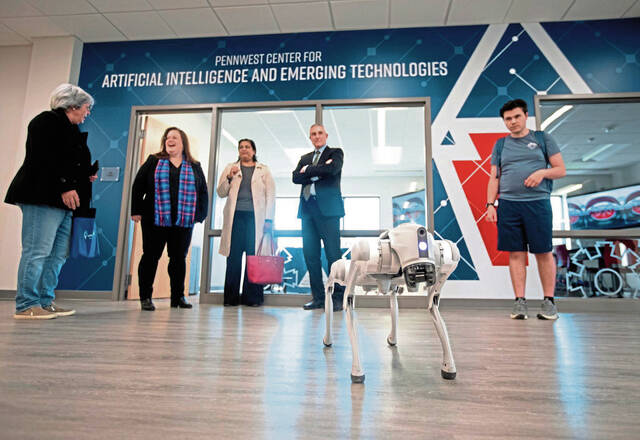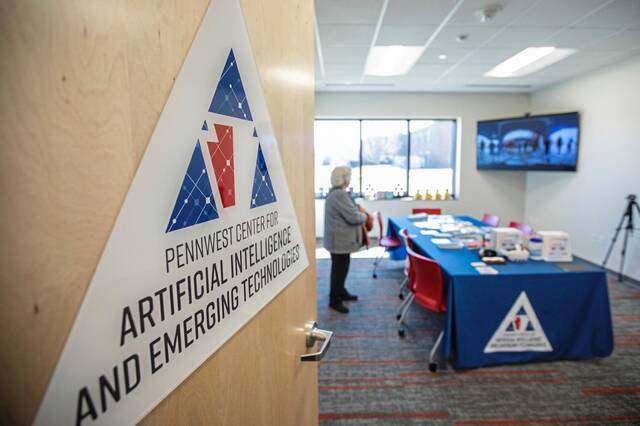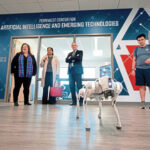When leaders in the business, manufacturing and education fields seek PennWest University students for internships and jobs, they’re not just asking if candidates are skilled in artificial intelligence.
They’re also asking if the students can lead AI training and development for their potential peers, said Camille Dempsey, director of the PennWest Center for Artificial Intelligence and Emerging Technologies.
A new program at PennWest University and Indiana University of Pennsylvania, among other colleges, aims to help meet that growing need.
“Higher education is being totally transformed by AI,” Dempsey said. “Things are going to continue to speed forward and accelerate faster than we’ve ever seen. The more we can prepare our students for what AI looks like in our disciplines and domains, the more prepared they’re going to be out of college.”
PennWest and IUP are two of five state system colleges in an expanded partnership with the Google AI for Education Accelerator, which will provide free access to self-paced, online AI training. It’s a certificate program that trains students in the ethical use of AI tools and how they can be applied to a variety of careers upon graduation.
The program is being offered to colleges across the country, though Google does not supply a comprehensive list of participating schools.
Officials say the goal of the program is to prepare the community, faculty, staff and students — regardless of their major — to use AI effectively and responsibly. PennWest comprises campuses in Clarion, California and Edinboro.
The other colleges in the partnership are Cheyney, East Stroudsburg and Millersville.
“Any knowledge you can get with AI in today’s world is absolutely going to benefit you,” said Kristen O’Hara, director of workforce development at IUP. “Anything you can do to give yourself an advantage, you should absolutely do, with the job market the way it is. I think it’s very beneficial.”
Knowledge of AI skills can help students study more efficiently, better understand complex material and communicate better, O’Hara said. They also can apply the training to help build resumes or work on projects in their field.
“I would think this could be applied to any industry or job,” O’Hara said. “You think of technology right away, but I really think it has a broad use.”
At a college campus, responsible AI use includes understanding how to use it to benefit academic progress while not plagiarizing and also checking the AI data output to make sure it is accurate and unbiased, Dempsey said.
Dempsey said people will receive a credential after completing the program. That will give them a leg up as they enter the workforce, she said.
That’s especially important in Pennsylvania, where U.S. Sen. Dave McCormick held an AI and energy summit this summer at Carnegie Mellon University. In July, an analysis from nonprofit Code for America ranked the state in the top three nationwide for AI readiness.
“People with this information of AI will be moving forward, and others will be left behind,” Dempsey said.
Training and development of AI expands beyond the state schools. Carnegie Mellon University and the Bank of New York Mellon announced Thursday a five-year, $10 million collaboration with an AI lab for faculty, staff and students on campus. An opening is slated for spring.
At IUP, there have been many requests from students and faculty about opportunities to learn more about AI, O’Hara said. The course also will be open to people in the community. Seats in the course are limited, Dempsey said.
“AI has amazing capabilities, and we want to stay on the cutting edge of what’s out there,” O’Hara said.
Said Dempsey: “This is important because we’re all learning together. AI is accelerating and things are moving all so fast. What we’re finding at PennWest is there’s a need for faculty development with AI, as there is for students.”
In 2023, the state system partnered with Google to offer Google Career Certificates, which offered skills training in cyber security, data analytics, digital marketing and e-commerce, business intelligence, IT support, project management and user experience design.
Dempsey and O’Hara said that while much is unknown about the future of AI in higher education, it’s important for universities and students to stay up to date with the latest developments.
“AI is moving faster than any other technology in the history of the world,” Dempsey said. “If we can leverage that kind of learning, it allows people to move forward with those skills and keep up.”
AI literacy
One such example of the expansion of AI in the education space is through the Canvas learning platform, which is the main online platform used by numerous universities, including the University of Pittsburgh and Penn State University, as well as K-12 school districts.
Instructure, the maker of Canvas, and OpenAI announced their global partnership this summer — which will bring AI tools into the classroom by embedding OpenAI’s technology, titled IgniteAI, directly into Canvas.
Penn State is one of the local institutions testing these AI tools, according to Chris Millet, acting associate vice provost for online education.
“Penn State has not at this time adopted any of these tools,” he said. “We’re in a phase right now where we’re learning about them … but not rolling anything out broadly yet.”
The institution has been focused on developing AI literacy to build “basic competency” across its campuses, which Millet called the “responsible approach” to these tools.
“I do think the tools are interesting,” Millet said. “Some of them are compelling.”
As of now, Penn State has a specific AI tool procurement process, according to Millet.
“Any time faculty want to purchase an AI tool, that actually gets pretty strict review,” he said. “That’s basically the front line (so) what actually makes it into the classroom is safe for students.”
IgniteAI is intended to simplify and streamline the use of AI directly within Canvas — allowing educators to create quizzes, generate rubrics, summarize discussions, align content to outcomes and more.
Ryan Lufkin, vice president of global academic strategy at Instructure, said the decision whether to implement IgniteAI within Canvas rests solely in each institution’s hands.
“We don’t turn any of these tools on without consent,” he said. “There are still a lot of educators who don’t trust AI. We want to make sure they don’t feel forced into something they are not supportive of.”
Lufkin, like Millet, said the goal is driving AI literacy. This iteration of Ignite AI is more focused on the educator side rather than the student side, he said.
“I would rather vie on the side of being cautious rather than jumping into some cool new tool,” said Millet, citing ethical concerns. “It’s a mutual learning process where we’re all trying to get up to speed and do this the right way.”
Preventing cheating
Perhaps the most notable concern associated with AI in the classroom is the potential for plagiarism and cheating.
Lufkin said one example of IgniteAI’s features is the opportunity for students to interact with the tool as if it were a famous literary character, like Tom Sawyer, for example. The instructor would then have access to the students’ chat threads to look at how they were approaching the conversations. It would allow the instructor to further personalize lessons and feedback.
“We are firm believers that the connection between the educator and the student is the heart of learning,” he said. “When a teacher can’t be around, that (AI) teaching assistant can actually be there to answer … questions or (offer) guidance, more personalized learning experience for students.”
AI is an extension to teaching — not a tool for cheating, according to Lufkin. His son has been using AI since elementary school, and he said he uses it daily in the workplace.
“The simple fact is the students are using these tools. What we’re lacking in the equation is that they’re being told not to use them as opposed to being told how to use them for a specific process,” he said. “Willfully pretending the technology doesn’t exist is really glossing over it.”
IgniteAI will be able to provide faster feedback for students, as grading fatigue affects educators often, Lufkin said. It also can be used for “smart search,” meaning the student or teacher could search keywords from previous lessons, and for studying purposes.
“These tools are actually trained not to give you the answer but actually use the Socratic answer to guide you to the answer,” he said.
AI also can create podcasts for students who struggle with reading quickly, according to Lufkin, to help with studying.
“There’s other tools that (students) can download to their phones,” he said. “If we’re just banning them and not explaining how to use them properly, we’re doing the kids a disservice.”
Millet said he’s excited about the personalized learning aspect of AI.
“In any classroom, students have differing levels of understanding of the concepts being taught,” he said. “Feedback is a really critical part of learning … so if AI can do something to help instructors provide more robust feedback, I think that’s another really valuable thing.”
Though Millet said education is in a “rough transitionary period” with AI tools, with people potentially using them inappropriately, he believes learning ultimately will benefit from them in the long run. Academic integrity is paramount, Millet said.
“We just have to be thoughtful about how we work through this period,” he said. “I do feel pretty confident … not rushing into this but doing so responsibly.”
Millet himself said he is learning more quickly than he ever has with the help of AI.
“I see glimmers of what the future holds,” he said. “I don’t think integrity issues (will go) away, but that’s always been a problem.”













